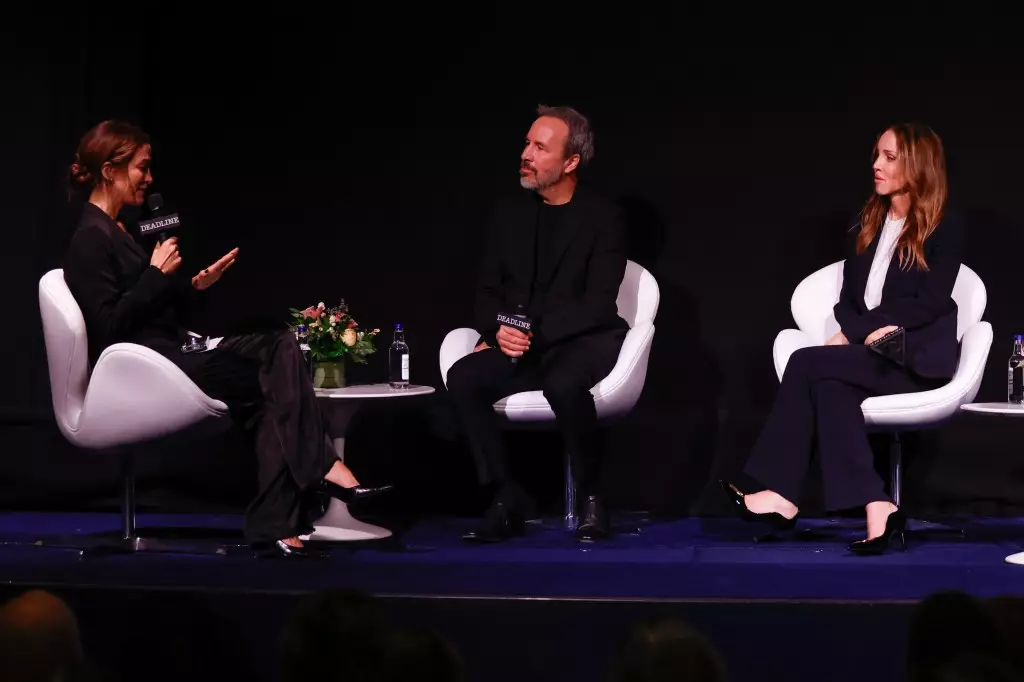Denis Villeneuve’s adaptation of Frank Herbert’s iconic novel, “Dune: Part Two,” pushes beyond mere entertainment, capturing the nuances of a cautionary tale that reflects on contemporary societal dynamics. During a recent panel at Contenders London, the film’s director, alongside producers Mary Parent and Tanya Lapointe, delved into the thematic fabric woven throughout the narrative. Villeneuve articulated his intention to remain faithful to Herbert’s cautionary insights, emphasizing the pitfalls associated with charismatic leaders and the fusion of religion and political authority. This foundational layer underscores a narrative that resonates deeply with current global events, extending its relevance well beyond the science fiction genre.
The film’s protagonist, Paul Atreides, portrayed by Timothée Chalamet, embarks on a tumultuous journey of vengeance against those who annihilated his family. Central to this quest is his connection with Chani (Zendaya) and the Fremen, highlighting a rich tapestry of relationships that bloom amid turmoil. The global success of the film, amassing a staggering $714 million, underscored not only its entertainment value but also its compelling and multifaceted narrative.
Mary Parent articulated a poignant observation regarding Herbert’s foresight in tackling timeless issues, remarking on humanity’s enduring struggles with power, environmental stewardship, and interpersonal ethics. Despite being penned in the 1960s, the themes within “Dune” resonate with alarming clarity in today’s fractured societal landscape. Parent’s assertion reflects a current truth: irrespective of technological advancements, we confront the same fundamental human conditions that continue to shape civilizations.
In this regard, “Dune: Part Two” serves as a profound exploration of youthful love set against a backdrop of existential crises. It uniquely positions the romance between Paul and Chani as central to the narrative, showcasing young individuals wrestling with the burdens of a world defined by conflict and turmoil. Villeneuve’s adept direction allows this love story to emerge as an emotional core, emphasizing the personal struggles and interpersonal connections that endure even in the face of overwhelming challenges.
Another notable aspect of Villeneuve’s vision is the examination of power dynamics through the lens of female empowerment. The portrayal of female characters, particularly the Bene Gesserit, challenges traditional perceptions of power. Lapointe highlighted how power is not merely a transient force but a long-term development, asserting that it has been meticulously plotted over centuries, and female characters possess significant agency within this schema.
The character of Lady Jessica, existing within the confines of the Bene Gesserit but driven by her unique motives, exemplifies this complexity. Such representations offer a refreshing contrast to typical narratives where women are often relegated to subordinate roles. Villeneuve’s commitment to showcasing individual agency among female characters reflects broader conversations in cinema about gender representation and the need for diverse perspectives.
Looking ahead, Villeneuve mused on the prospect of future installments, hinting that if a third film were to materialize, it would delve deeper into the themes of war and conflict. The notion that Paul may be compelled to initiate war to protect those he cares for underscores the stark realities that accompany leadership and responsibility. This potential trajectory maintains the thematic consistency of Herbert’s narrative, challenging audiences to reflect on the moral complexities inherent in power and its repercussions.
“Dune: Part Two” transcends its status as a mere cinematic adaptation, emerging as a profound cultural artifact that addresses timeless issues through the lens of compelling storytelling. Villeneuve, Parent, and Lapointe’s insights reflect a collaborative effort to navigate the intricate relationship between love, power, and the human experience, ensuring that audiences are not just passive observers, but engaged participants in a discourse that continues to shape our societal understanding. In a world fraught with challenges, “Dune: Part Two” stands as a reminder of the enduring relevance of its themes, inviting viewers to ponder the complexities of our shared existence.


Leave a Reply